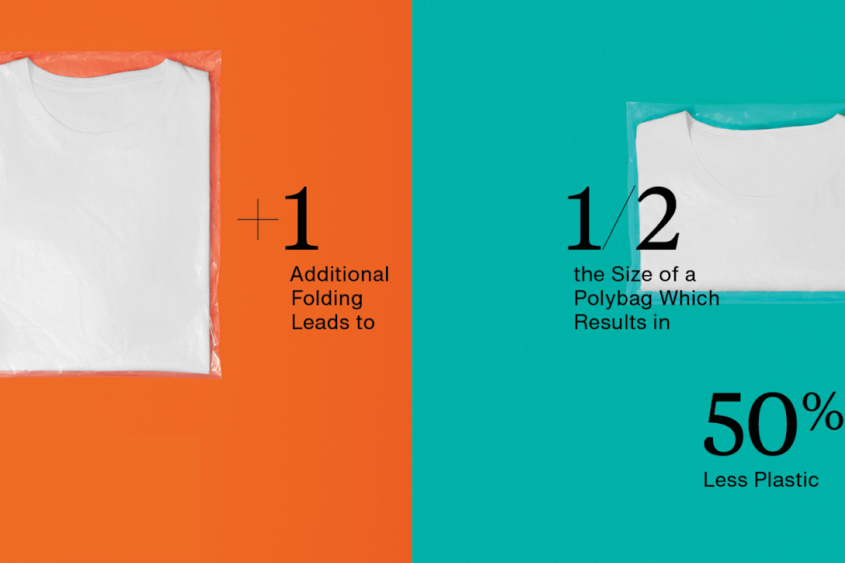The polybag challenge: reducing our reliance on single-use plastics
The polybag challenge: reducing our reliance on single-use plastics
These thin, transparent plastic bags, used to wrap individual items, are the biggest challenge for the global fashion industry. Can't we just get rid of them?
These thin, transparent plastic bags, used to wrap individual items, are the biggest challenge for the global fashion industry. Can't we just get rid of them?

Anyone who orders fashion online knows what a polybag is. These thin, transparent plastic bags, used to wrap individual items, are the biggest challenge for Zalando and the global fashion industry when it comes to avoiding single-use plastic. Can't we just get rid of them?
As a company committed to shaping a more sustainable fashion industry, Zalando is actively exploring ways to reduce the use of packaging – no matter what material it's made of – in its operations. To become more sustainable, we need to reduce our packaging volumes and move toward circular systems that reduce or eliminate waste that has to be incinerated or sent to landfill otherwise because it cannot be recycled or recovered in any meaningful way. We also have to eliminate single-use plastic, meaning packaging that is made of plastic and is not designed to be returned to the manufacturer or reused for the same purpose for which it was designed.
Easy handling and protection of items
So, why doesn't the fashion industry simply get rid of single-use plastic polybags and sell the items unpackaged? To answer that question, we need to take a look at the role of packaging: most items go on quite an adventurous journey after they leave the factory bound towards the end customer. They are produced, processed, transported and stored in warehouses until they are ordered. Changing storage conditions as well as automation technology throughout the supply chain can damage the items, which is why there needs to be a protective layer around each item. For fashion items, manufacturers usually choose polybags made of plastics because this light-weight material has been proven to shield the products against moisture, dirt, and damage during storage and processing.
However, there is another reason why each product is individually packaged. Zalando is supplied by several thousand brands and manufacturers. New goods arrive at our logistics centres almost every day. To ensure that the items reach us undamaged and can be processed immediately, suppliers have to deliver their items in a "retail ready" condition, meaning with individual packaging suitable for the sales unit to be sold to end consumers. This means that shoes, for example, have to be delivered bundled in pairs in a shoe box, as is usually the case in a store. For fashion items, plastic polybags are usually the most practical option as they are lightweight, not easily torn and transparent, which allows employees to quickly identify items or scan barcodes.
The challenging search for alternative materials
Polybags made of single-use plastic ensure products stay protected within operational processes, even if they are not necessarily the most sustainable solution. We have tested using polybags made from alternative materials such as paper for our own private label brands, However, we have found that this is often associated with higher repacking rates than plastic bags, as the paper polybags tear at different parts of the process and end up requiring an additional polybag to properly protect the item, causing additional waste. To implement a paper polybag that is fit for purpose, we would need to increase their durability and thickness, adding material and weight. We are still searching for a perfect solution that is scientifically proven to be more sustainable option.
Minimising the use of polybags
However, we are taking steps to minimise our use of polybags whenever possible, like introducing more efficient folding techniques for our Private Labels and using thinner bags for the products sold in our Fashion Store. Through these initiatives, we saved 919 metric tons of single-use plastic in 2022. In our Nordic markets, we piloted customer-facing reusable polybags with 100% recycled content. These are less likely to be damaged when opened. If customers return them to us intact, they can be used again.

Still, eliminating single-use plastics remains a key obstacle to Zalando achieving its sustainability goals. Finding the perfect solution is a complex task, especially in a landscape where more sustainable alternatives are not yet fully scalable or may not meet the minimum requirements to be a more sustainable solution. We are navigating these complexities with a focus on continuous improvement and collaboration with industry experts and our partners.

Our eyes and ears for workplace equality
Meet the Equality Allyship Network, the group of volunteers who help make Zalando an even safer and more respectful workplace

Dive into the creations of the Design Academy class of 23/24
Learn more about the innovative designs of the participants and their creative approach to challenges of the fashion industry

Again and again and again: exploring reusable packaging
Bottle deposit schemes have shown us what’s possible: drink up, return and refill. Repeat up to 50 times. Why not use it for packaging in e-commerce?

The polybag challenge: reducing our reliance on single-use plastics
These thin, transparent plastic bags, used to wrap individual items, are the biggest challenge for the global fashion industry. Can't we just get rid of them?

Unwrapping the change: How Zalando wants to minimise the impact of packaging on the environment...
Packaging is a pivotal component in Zalando’s commitment to sustainability and reducing our environmental footprint

Minimum Wages in Bangladesh - Zalando stays and pays
Zalando’s statement on the minimum wage negotiations in Bangladesh

Design Academy: How Zalando supports young fashion designers
Ten talented young designers will showcase their innovative creations during Berlin Fashion Week 24